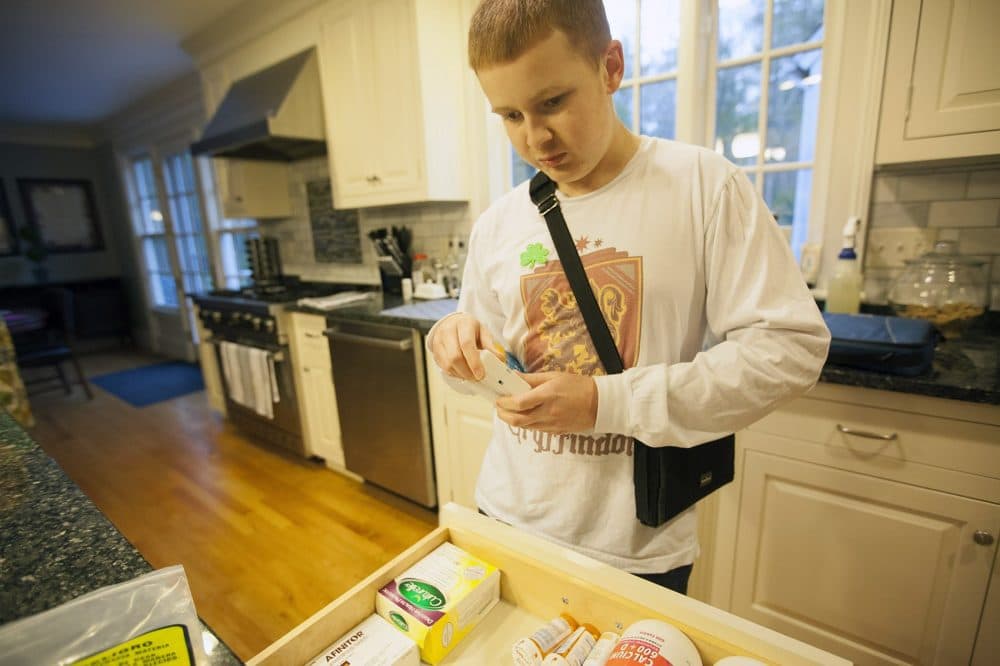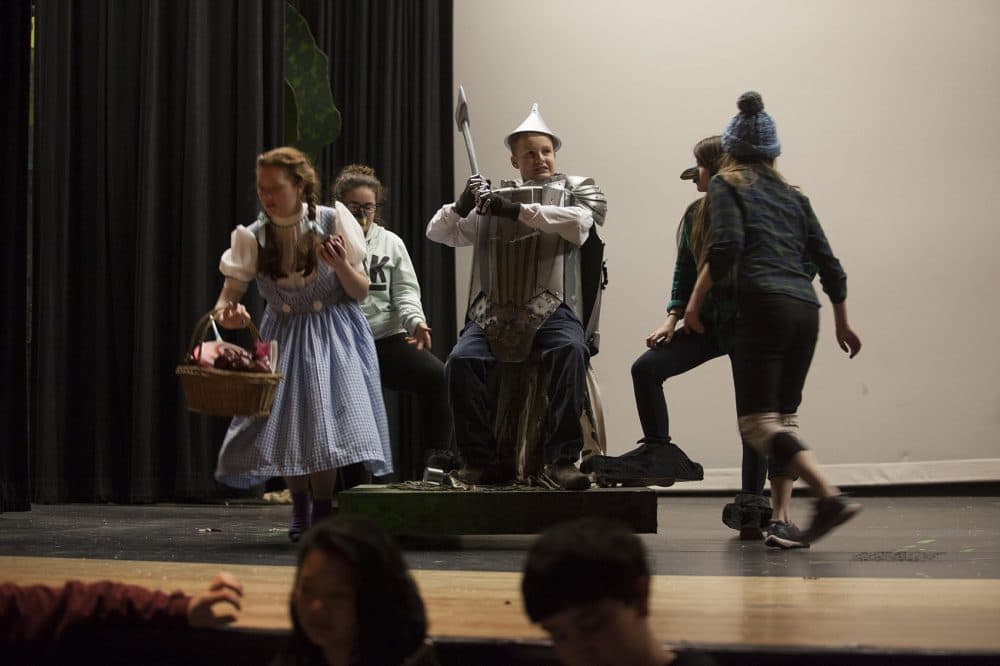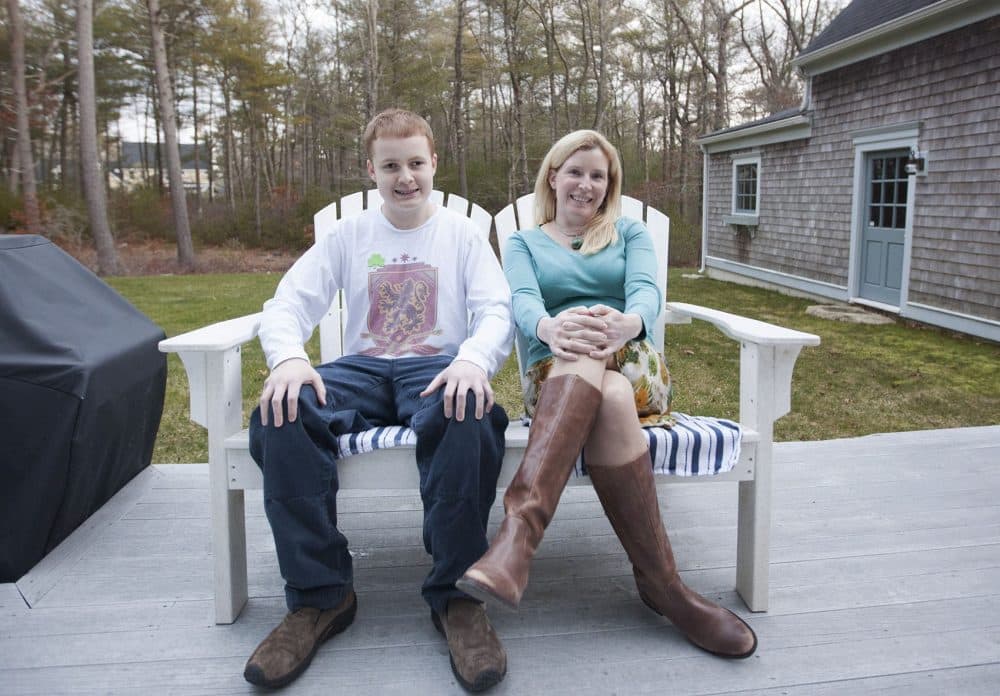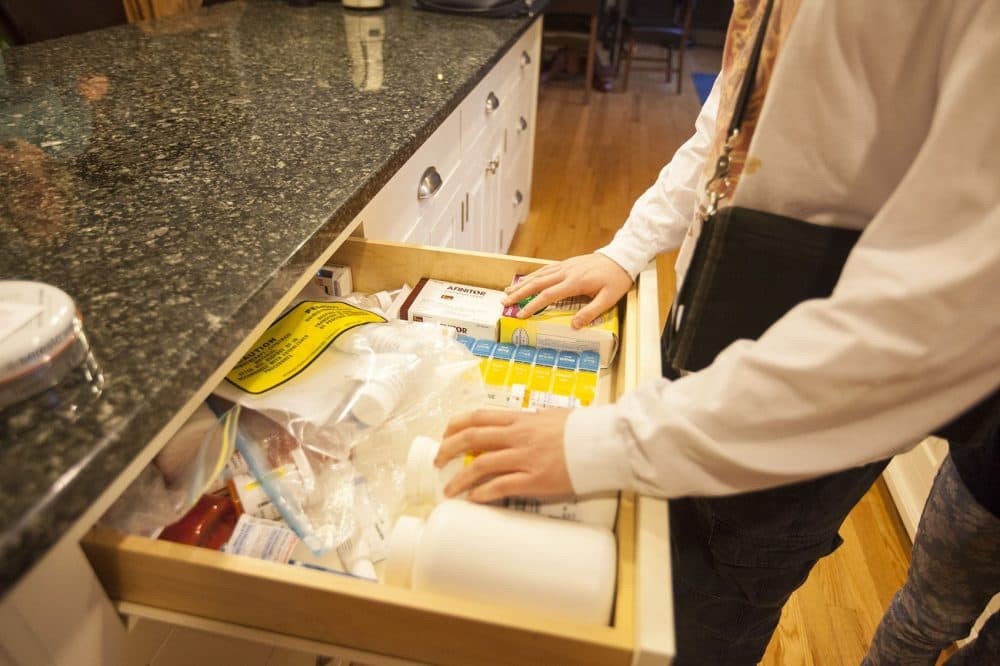Advertisement
When Cancer Can't Be Cured, Low-Dose Chemo Aims To Keep It In Check

Chances are pretty good that right this minute, you have some sort of dormant cancer. Autopsies of people who die of other causes find most of them had tiny, latent cancers — in their breasts or thyroids or prostates.
"Probably, as we sit here, we have cancerous nodules that our body is able to suppress through our natural, native immunity," says Dr. Giannoula Lakka Klement of Tufts Medical Center.
That ability to keep cancer in check is what Dr. Klement tries to foster in her patients with the disease — like 16-year-old Nick Claudio from Marion, Massachusetts. The summer he was 9 years old, Nick started seeing black spots and had trouble reading at camp.
"They found an orange-sized brain tumor in my brain," he recalls matter-of-factly. "And the next day they took it out in a brain surgery, and I awoke from it with no eyesight."
Being blind doesn't stop Nick from leading a pretty regular life — from high school drama productions (he played the Tin Man last year in "The Wizard of Oz") to honors classes. But one aspect of his life is not so typical.

"Tarceva. I have [it] before breakfast as I'm getting out of bed every other morning," he narrates as he rummages among medication boxes in a kitchen drawer. "And then my other chemo is Afinitor, which is in a box. Those are at night."
Most of the time, Nick is on this drug regimen, called "low-dose chemo." It's also known as "metronomic therapy" because it's relatively regular, like a metronome. And "adaptive therapy."
Whatever you call it, it differs dramatically from the usual practice. Doctors usually attack cancer with chemo as aggressively as a patient can bear. Then, after a break, they do it again. And again. But that hard-hitting chemo tactic can have a downside: a few cancer cells may survive, and the cancer comes roaring back.
"The cancer shrinks, everybody’s happy, and then the roller coaster of relapse, re-treatment, and recurrence gets repeated over years," Dr. Klement says.
Advertisement
She and some other cancer specialists are trying a much gentler, steadier drug regimen that aims not to cure cancer but to keep it at bay. They think it could help with a central challenge they face: that many cancers evolve and become resistant to treatment.
Cancer As An Eco-System
Nick Claudio's mother, Allison Isherwood, says that initially the tumors caused by his rare cancer posed an imminent threat to his life, so it made sense to hit them aggressively, to get them under control.
"Now," she says, "where it's more of just trying to just keep them under control, I think it makes far more sense to use the low-dose chemo so that he can continue to live his life and not have to be in the hospital all the time."

It's still considered experimental, but Dr. Klement says low-dose chemo makes biological sense if you think of cancer as not just a simple lump of a tumor you try to fully eradicate. Cancer involves a complex eco-system: a given tumor might have a billion cells, and research finds that each cell may have slightly different genes.
"Cancers are basically evolution on overdrive," says Jesse Boehm, associate director of the cancer program at the Broad Institute in Cambridge. With all the genetically different cells in a tumor, some may randomly have variations, DNA "spelling changes," that protect them from drugs.
"And so when one gives a therapy, one actually selects — this is actually the process of evolution — you kill most of them but you select for the subset of cells that have randomly had a spelling change that makes them resistant," he says. "And if a single cell in a tumor of a billion cells has that property, resistance is inevitable."
Fixing The 'Neighborhood'
Low-dose chemo may also enhance the hottest thing in cancer treatment these days: immunotherapy drugs that unleash the patient's own immune system against the tumor.
Right now, immunotherapy helps less than a quarter of the cancer patients who get it. But Dr. Rakesh Jain, of Massachusetts General Hospital, says low-dose chemo in combination with immunotherapy drugs could make them more effective. For example, it could help the blood vessels going into the tumor function better, so more immune cells can get in to attack the cancer.
Cancer isn't about just the tumor, he says, it's about the tumor's "micro-environment" — the immune cells and blood vessels and inflammation that interact with it in what he calls the tumor's "neighborhood."
"My thinking is, the 75 percent of patients who do not benefit from immunotherapy currently would if you could fix the neighborhood also," Jain says.
So he sees promise in low-dose chemo, but he also remains cautious about it. Though doctors like Klement may see good results in their patients, there's been no definitive proof from gold-standard clinical trials that low-dose works better than standard chemo.
"It's like so many things in science and medicine. It's an interesting idea. It's an interesting theory. It's supported to some extent by laboratory studies. But the proof is in how well it works in patients."
Dr. Richard Schilsky, medical director of the American Society of Clinical Oncology
Similar caution comes from Dr. Richard Schilsky, the medical director of the American Society of Clinical Oncology. He says the highest quality trials that have been done so far have generally not proven low-dose chemo to be better than conventional chemo.
"It's like so many things in science and medicine," he says. "It's an interesting idea. It's an interesting theory. It's supported to some extent by laboratory studies. But the proof is in how well it works in patients. And in patients it remains an unproven treatment, as far as I can tell."
'We Don't Know If This Will Work, But...'
Unproven — but of wide interest. The government registry for clinical trials lists 178 current studies of low-dose — or metronomic — chemotherapy.
Dr. Klement, of Tufts, points out that it's hard to get the tens of millions of dollars needed for a definitive trial of a new way to use old drugs, because no drug company stands to gain new profits from it. But she expects that as more patients learn about low-dose chemo, more will ask for it. For now, she uses it for patients whose cancer doesn't — or clearly wouldn't — respond to other therapies.
"The way I tell it to my patients is: We don't know if this is going to work, but we know that the traditional way will not," she says.
That's the case for 16-year-old Nick. He still has tumors in his brain, but more surgery could cost him his hearing.

"His first tumors caused him to lose his eyesight. The second tumors are sitting on his auditory nerves, so given that he had already lost his eyesight, going in to get them surgically was not an option," explains Isherwood, Nick's mom. "So that's a big part of the reason why we're going after them constantly and not letting them start to grow at all."
"Plenty of people who are deaf-blind have been very successful with their lives," Nick notes. "But I would just prefer not to lose it if I don't have to."
So Nick expects to be living with cancer on his low-dose chemo regimen pretty much indefinitely, or until research finds better ways to conquer cancer like his. Many researchers, like Jesse Boehm of the Broad Institute, are tackling the challenge of the resistance that cancer develops, and expect the solution to come from a combination of drugs, much as it did with HIV.
Meanwhile, Nick is deciding which colleges to apply to. He aims to become a lawyer, and someday a judge.
"Just because you're blind doesn't mean you're hopeless," he says. "Blind people can do anything they want."
This segment aired on May 19, 2017.
